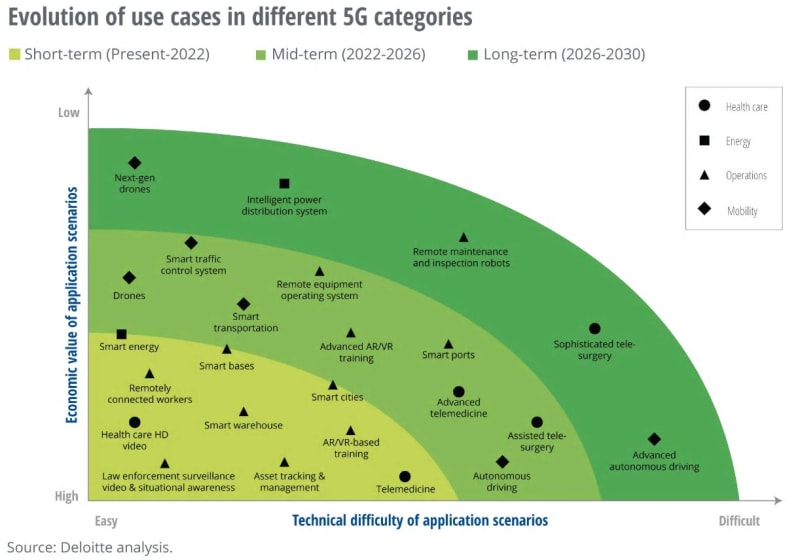5G or not 5G? That is the question | Deloitte UK has been saved
Liz Jones, technology partner at Deloitte in Wales, talks about 5G and how it can bring a competitive advantage to businesses in Wales.
Before the COVID-19 pandemic, 5G was often seen as the holy grail by data-heavy mobile users who eagerly awaited the roll-out by operators and ultimately a shiny new smartphone. They couldn’t wait to take advantage of what 5G networks deliver: faster speeds, better reliability and improved capacity. In fact, 5G networks will bring benefits for both consumers and businesses, such as faster streaming, reduced latency and better network performance in peak times.
Around 98% of mobile users in the UK are yet to upgrade to 5G - which in itself presents a huge opportunity for operators to tap into - according to recent research carried out by Deloitte in our Digital Consumer Trends survey. It reveals that enthusiasm for 5G has stilled in the current climate, or perhaps you could say it’s been deferred. Working from home and less commuting has dampened people’s desire for better connectivity as they are no longer frequenting congested network areas as often.
5G roll-out
This has impacted mobile operators who, without consumer demand, have delayed deploying networks until there is a return to high demand in traditionally busy urban areas. Operators are also experiencing fewer opportunities to promote 5G to both consumers and business leaders, even though 5G is set to facilitate the continued growth of the digital economy by supporting better experiences for individuals, businesses and industries. It will also facilitate more applications that require greater capacity for connectivity as 5G promises to deliver data 10 to 20 times faster than current 4G technology.
With only a few areas in Wales currently having live 5G, for example places like Cardiff, Llandudno and Penarth, deployment is progressing slowly in other cities. Swansea is one, for example, and the news that the city council recently approved the installation of two masts was welcomed by many. More widely, the potential for 5G in Wales is certainly being explored. In fact two multi-million pound investments have already been secured: the first being the Digital Signal Processing Centre of Excellence at Bangor University announced last autumn; and the second for unlocking the potential of 5G technology in rural Wales confirmed this spring.
Why invest in 5G?
Mobile technologies can increase the effectiveness of employees by reducing the down time associated with commuting, and continue to aid workplace flexibility, which enhances productivity. In addition to the economic benefits, there are social ones, especially those delivered in smart cities.
You may have read about 5G enabling remote surgery, autonomous vehicles or delivery drones, but 5G’s biggest impact is set to be behind the scenes: inside factories, warehouses, depots and industrial plants. It will particularly enable greater activity in more labour heavy sectors such as manufacturing.
It is still early days in the race toward advanced connectivity, but advanced wireless technologies will likely become an essential part of the fabric that links billions of devices, machines, and people in the hyperconnected era. They promise dramatic performance improvements - faster speeds of between 1 to 20 Gbps, increased data capacity, lower latency, greater device density, and precise location sensing—that make wireless an attractive alternative to wired or fixed networks for heavy-bandwidth, time-sensitive needs.
The pandemic has certainly highlighted the need for ever-present, secure, and high-quality connectivity to maintain business operations whilst at the same time reducing on-site personnel. Moreover, I expect to see a surge in demand for automation – the current environment has underlined the value of emerging virtualisation and automation capabilities that enable more flexible, remote management of business operations.
All in all, 5G deployments will benefit most sectors via the enablement of new business models. Alongside manufacturing, other industries that could benefit from the advantages of 5G include public and emergency services, financial services, automotive, public transport, media, entertainment, travel, leisure, energy and utilities as well as healthcare. For example, virtual and augmented reality applications are currently used in healthcare, but there are other health applications that could benefit from a greater reliability in network connections.
Here’s how Deloitte sees the use of 5G evolving in the short to long term in different scenarios such as healthcare, energy, operations and mobility.

Demystifying 5G
Misinformation does surround 5G, however, especially as many people mistakenly assume it’s simply a faster version of 4G. Also, our Digital Consumer Trends survey found that 43% of UK consumers are unsure whether or not 5G technology poses a health risk. Worries about health impacts from radio waves have always existed, flaring up at the launch of 3G, 4G and Tetra networks. I think that 5G myths have been among the most seen and shared of untruths in 2020, with a cascade of 5G misinformation sweeping across social media, blogs and fake news sites.
You could also say that this misinformation is also a factor in slowing down the roll-out. The telecommunications industry has a challenging but pressing task on its hands to not only educate consumers over the safety of 5G to support uptake of the technology, but also business leaders on the benefits to their operations. Indeed, our survey found that about two-thirds of adults aged 16-75 in the UK say that they ‘do not know enough about 5G’.
In my view, 5G is a fundamental shift in wireless connectivity, potentially as transformational as the shift to cloud computing. It has the potential to become the world’s predominant LAN and WAN technology over the next 10 to 20 years.
Unlocking value
As illustrated earlier, businesses, as well as government agencies, will benefit from a variety of uses to enhance their operations, which will in turn create new ways of unlocking value. 5G will lead to new service and product offerings that will create further value for businesses, while helping them to engage with customers in new ways. New 5G applications will also enable further value through creating new efficiencies in how they operate.
Unsurprisingly, mobile operators tend to deploy networks to meet anticipated demand by their subscribers – but currently this has shifted from urban to residential areas and is temporarily far more diffused. Therefore, we may find that operators will consider delaying the deployment of 5G networks in traditionally busy, urban areas until there is a return to high demand.
A competitive advantage
To enable connectivity across an enterprise, a company likely has two basic options. It can connect to a public 5G network. Or it can opt for a private 5G network, either by purchasing its own infrastructure while contracting for operational support from a mobile operator, or by building and maintaining its own 5G network using its own spectrum. For many of the world’s largest businesses, private 5G will likely become the preferred choice, especially for industrial environments such as manufacturing plants, logistics centres, and ports. Medium-sized and smaller companies are more likely to lease network equipment, outsource network management, and sublease spectrum (geo-fenced to their location) from a public mobile operator.
To conclude, 5G is the next generation of mobile networks. More than an upgrade, 5G will complement the broader network ecosystem, working with the latest mobile networks, and broadband infrastructure to create more seamless connectivity. It is just one newly emerged technology that will transform our working, home and social lives.
Organisations moving to adopt next-gen wireless strongly believe it has the potential to provide competitive advantage, unlock the power of other emerging technologies, and transform their organisation and industry.
Businesses that transform, innovate and meet disruption head on, lead the way in reimagining their future. As for the question 5G or not 5G, as a business leader you have to ask yourself: do you want your business to be one breaking new ground or one playing catch up?
Deloitte’s technology consulting expertise
Today, business and technology innovation are inextricably linked and the demand for technology-enabled business transformation services is rapidly growing. Deloitte’s technology professionals help clients resolve their most critical information and technology challenges. We’re proud to work with many clients across Wales both in the public sector and across many industries in the private sector. We’re keen to work with local businesses and organisations of all sizes to continue the advancement of technology in our community and society. Please get in touch.
Key contact

Liz Jones
Liz is a partner in Deloitte's Consulting practice and specialises in advising public sector organisations with IT transformation programmes. She has over 20 years of project, programme management and consulting experience.

